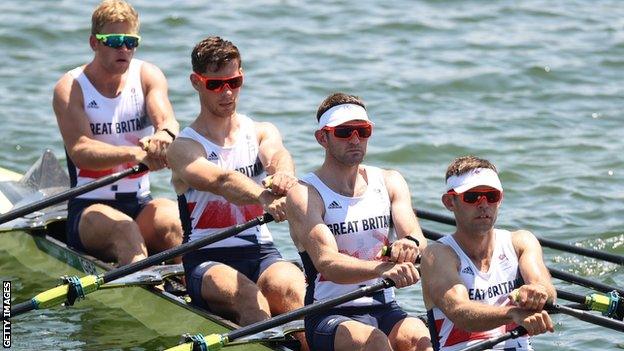British rowing 'put to bed' concerns after Olympics failure
- Published

Harry Leask, Angus Groom, Tom Barras and Jack Beaumont won silver in the men's quadruple sculls in Tokyo
British Rowing is trying to rediscover its "performance culture" but in a "very human way" following a disappointing Olympics last summer, says its new performance director.
The two medals won in Tokyo represented Team GB's lowest medal haul since Atlanta 1996 and it was the first time since 1980 that they did not return with a gold medal.
Louise Kingsley, who was appointed last December, said the organisation is experiencing a "new beginning", having undergone a "big staff restructure".
She said she is confident they have "put to bed" some of the concerns raised in Tokyo, while the new women's head coach said there is "no reason why we can't be back at the top in 2024".
Kingsley said the post-Olympics review was "very tough" and described the five-year cycle as "tortuous".
"We've done a lot of analysis and I think what we've put in place are very much elements that will address the concerns or perhaps areas we didn't do quite so well in in the last cycle," she said.
"I think overwhelmingly our athletes are a really exciting group of athletes and we've got some great coaches and support staff. I'm confident that with the new cycle starting we have put to bed some of the concerns we had and some of the things we didn't do so well. I think we're in a good place."
Joshua Bugajski, who won a bronze medal in the men's eight, said his critical comments in Tokyo - where he talked of "dark days" under former coach Jurgen Grobler - had been acted upon by the leadership team.
Grobler, the most successful Olympic rowing coach in history, stepped down in August 2020.
"I said what I felt at the time, the timing of it could have always been a bit better, everything is a bit heightened when you've just come off the water in an Olympic final and it's a time of very high emotions," he told BBC Sport.
"I think coming out of it everything has been listened to and I think we are moving along as a sport."
Of the culture within the new system, Kingsley said: "What we are trying to do here is get some of our performance culture back but in a very human way, so working with the athletes as individual people, providing some flexibility where it's appropriate to provide flexibility but overwhelmingly trying to bring the cohort together with a voice but with performance as well."
A number of high-profile names are yet to decide on their futures, including two-time Olympic champion Helen Glover, 2016 Olympic champion Moe Sbihi, and Olympic silver medallists Polly Swan and Karen Bennett.
Kingsley said they were giving those athletes "space to make some good decisions".